Wrestling
‘Made it Work’: How John Smith’s Coaching Career Began at 26 Alongside Teammate Kenny Monday
‘John is your ultimate competitor.’
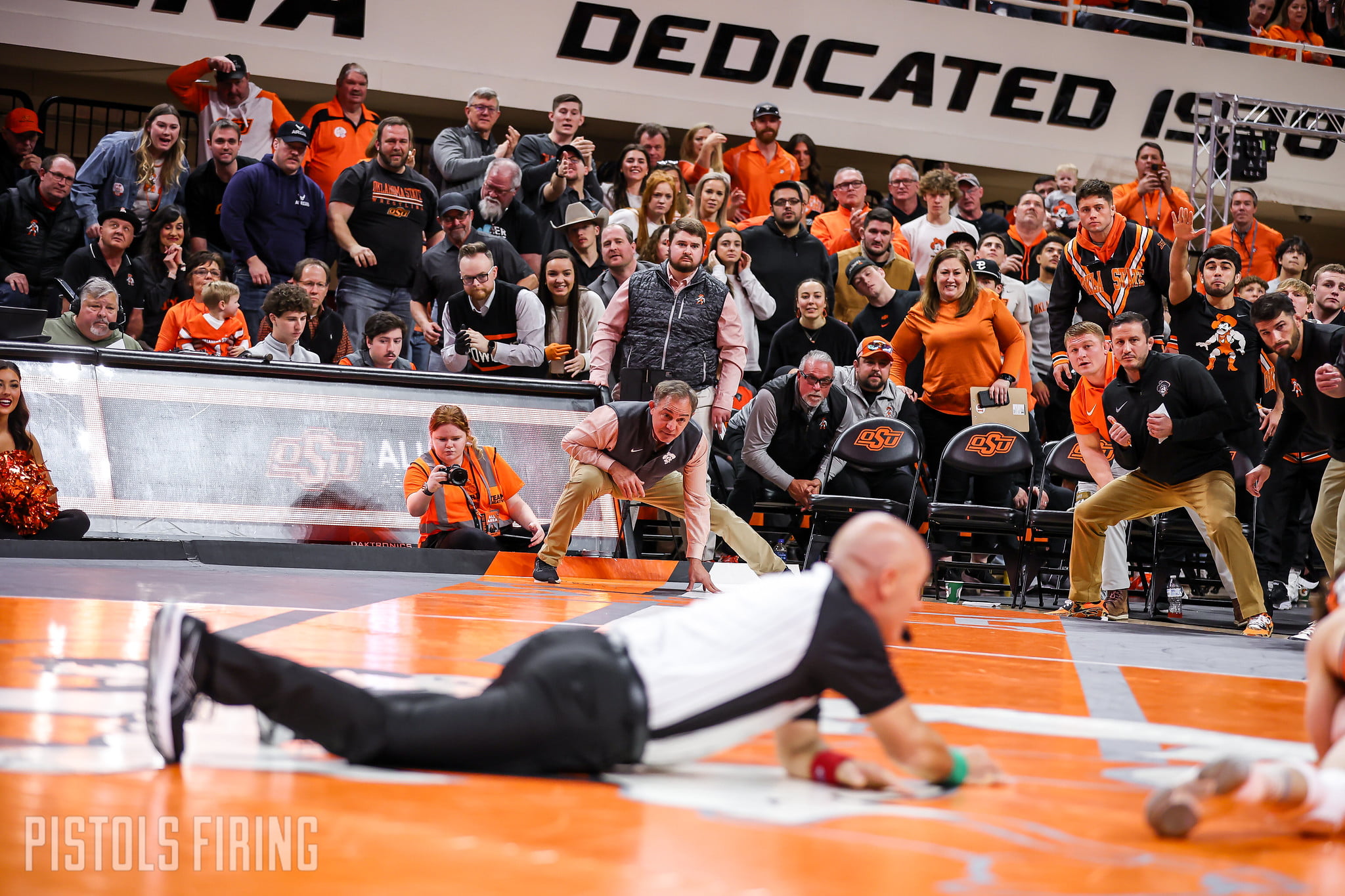
There was a beginning to John Smith’s 33-year reign as Cowboy Wrestling’s head coach, and that start was before 30-plus years ago.
Oklahoma State announced Smith’s retirement as head coach on Thursday. He accepted the position in 1991 alongside former OSU and Team USA teammate Kenny Monday before fully taking the reigns the next year. Since, Smith has led five NCAA championship teams, 33 individual NCAA champions, 153 All-Americans, two Hodge Trophy winners and recorded a program-best 490 career dual wins. And Monday was by Smith’s side since the beginning.
“We’re all proud of the legacy that he leaves at Oklahoma State,” Monday said. “John’s always been a winner. He’s always been a winner. That’s why I said I know it’s kind of hard for him to go out not being a winner. But just always been a fierce competitor, man. Ever since I’ve known John, man, he’s always been a fierce competitor.”
It was a wrestling match between two future Olympic gold medalists as Monday held Smith to the ground. They were long from representing their country and leading Division-I wrestling programs at that point, though. It was the first time Smith met Monday, and he already wanted to try to take down the highly touted, much bigger and older Monday. Monday was staying with the Smith family for a wrestling tournament at 13 years old. Smith was 9.
An undersized Smith shot to no avail before Monday had him pinned on the floor. The young Smith was spittin’ mad — literally. He squirmed and spit at Monday in anger at the thought of not being able to take him on. Of course that only frustrated Monday, who says he held Smith down for the next 30 minutes until tears were shed.
“He was so pissed off,” Monday reminisced. “… I’m like, ‘Dude, if you spit on me again I’m gonna slap the crap out of you.’ Then he spits again. …
“At that point, he just couldn’t accept the fact that he couldn’t beat me. He was too little. … Right then, I was like, ‘He’s gonna be something’ because he just had confidence right then that he could win. He had a lot of confidence. He just couldn’t accept the fact that he wasn’t winning that thing.”
Both eventually became teammates at OSU when Monday was a senior and won an individual NCAA title in 1984. Smith won back-to-back national titles in 1987 and 1988. Then the Cowboys won two straight national championships as Monday and Smith started their international careers — still training in the Cowboy wrestling room.
But in 1991, an NCAA investigation led to sanctions on the wrestling program and head coach Joe Seay ultimately being removed. Penalties included a postseason ban for the 1992-93 season [Smith’s first season in sole control] and no scholarships until 1994. This also allowed OSU wrestlers the freedom to transfer. Because of that, administration wanted to keep the current team intact as much as possible, and with Smith and Monday already around the program training and assisting, they were named co-coaches for the 1991-92 season because of their prior relationships.
Neither were even 30 years old yet, as Smith was 26 and Monday celebrated his 30th birthday that season. Both had already won gold medals at the 1988 Seoul Olympic Games. Both eventually made Team USA again in 1992 to compete at the Barcelona Olympic Games — where Smith claimed gold again and Monday got silver — which they prepared for while also leading a Division-I program.
“Made it work, man,” Monday said. “We just made it work. Of course John and I had been training together and on teams together, so we knew each other very well. We just made the decision to step in for the program. It gave us an opportunity to train and do our thing. So kind of just what we did.
“We made it work. And again, our relationship with the guys that was already on the team was strong. We said, ‘Listen, here’s the situation. It is what it is. We can’t change it. All we can do is deal with what we have, deal with the cards we have, and we’ll make the best of it. If you guys follow our lead, we’re gonna train, we’re gonna practice, we’re gonna get you ready to compete, and you’re gonna go out there and compete and do what we do, do what we love.’ So I think John and I, there were no egos involved, it was just we’re doing what we have to do to move the program forward and that’s just kind of what we did.”
Smith and Monday ran practice, with Smith handling the lower weights and Monday the heavier weights. Athletic director Myron Roderick and associate athletic director Dave Martin, as well as former wrestling coach Tommy Chesbro who was still around the university, helped the young coaches with paperwork and scheduling and whatever else arose off the mat.
The Cowboys went 7-0 in duals under Smith and Monday, being ranked inside the top five all season. They finished second at the NCAA tournament, with Smith’s brother, Pat, winning his third of four individual titles.
“We had an incredible team,” Monday said. “That always makes it better when you’ve got talent like that. That’s going to make it better when you got talent in the room and these guys are already winning – they know what winning feels like and what it looks like, and then you kind of just keep that ball rolling. Then, being who [Smith] is, recruiting is not going to be real hard. He went through some tough times. He went through some tough times just trying to get it off the ground. Once he got past that team that we had assembled [in 1991], it was tough to kind of get back and get some recruits in there, but I think he kind of figured it out and kind of got on a run after that.”
Smith stepped away from competing after the ’92 Olympics and took control of Cowboy Wrestling by himself that year. That first season under Smith, OSU went 4-7 in duals with no postseason because of those NCAA sanctions. By the end of Smith’s second season in 1994, the Cowboys were national champions. He eventually led teams to four in a row in 2002-06.
Along with one of his friends, Smith was handed control of a storied Division-I program in the midst of NCAA sanctions at 26 years old. And he turned it into a 33-year career that he finished on his own terms at 58.
“John is your ultimate competitor,” Monday said. “He hates to lose, loves to win. And he’s been that way since he’s been a little kid. You play the video game, he’s there to win. If you’re playing ping pong, he’s there to win. That’s what I mean by instincts. He’s a winner, and he’s a competitor. That’s what drives it. That’s why he was successful for 33 years because of his competitive nature and his love for winning. And he’s an intelligent guy. He’s a smart guy. He understands the sport. He understands how to win. He understands how to prepare to win. Those things, and it’s just about surrounding yourself with good people and just trying to keep that ball rolling. …
“He cares so much about the legacy of Oklahoma State. You gotta draw back on just the history of Oklahoma State — the national championships that has already been won, the shoulders that you stand on in that position – Ed Gallagher, Myron Rodrick, Tommy Chesbro. The shoulders that you stand on, it inspires you to be great. It inspires you to not allow that legacy to slip. I know there’s some tough years in there, but I think it’s just the way he’s wired. The Smith family is – you just look at the family. … I’ve been knowing them for a long time and they’ve always been just as competitive as him, and I love them for it. I’m like, these dudes wanna win. We had some great times training together and traveling the world together. I think it’s just the way he is wired, man. It’s his family. He’s one of a kind. He’s one of a kind, for sure.”

-
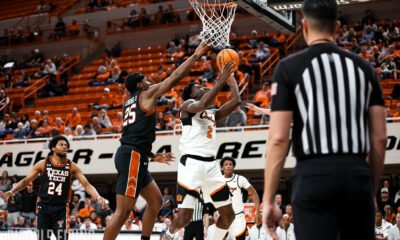
 Hoops4 days ago
Hoops4 days agoTexas Tech Transfer Robert Jennings Commits to Oklahoma State
-
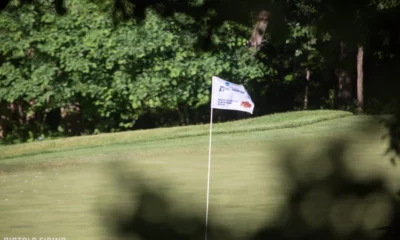
 Golf5 days ago
Golf5 days agoOSU Freshman Preston Stout Sinks Long Putt to Earn Share of Big 12 Title
-
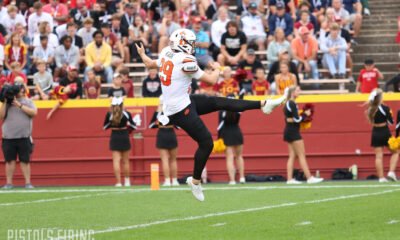
 Football5 days ago
Football5 days agoAustrailian Punter Hudson Kaak Details Transition to Stillwater, Football
-
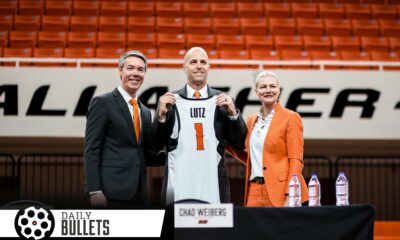
 Daily Bullets4 days ago
Daily Bullets4 days agoDaily Bullets (Apr. 25): Pokes Land a Guard, Cowboy Wins Share of Big 12 Title






